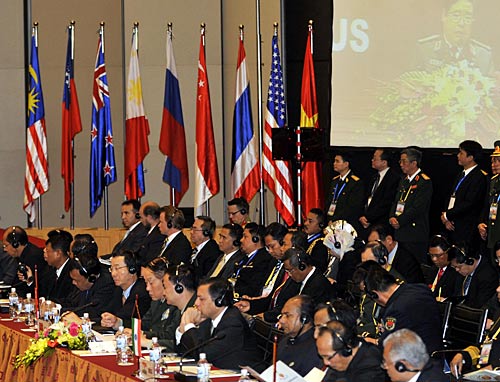|
 |
|
A LARGER CONFERENCE: The first ASEAN Defense Ministers' Meeting Plus opens in Hanoi on October 12. The 10 ASEAN nations participated, as did China, Japan, the Republic of Korea, India, Australia, New Zealand, Russia and the United States (HUANG XIAOYONG) |

Exchanges between the United States and Viet Nam have continued to grow since the two countries normalized diplomatic relationship in 1995. Their bilateral relationship has also improved steadily.
After Barack Obama took office, Washington declared it would focus on its relationships in Southeast Asia. The United States concentrated mainly on Viet Nam and Indonesia. Since the start of 2010, the U.S.-Viet Nam relationship has heated up so much that it has now gained worldwide attention. Nowhere is this more obvious than in the countries bordering the South China Sea.
Improving relations
Politically, the two nations have become much closer. U.S. Secretary of State Hillary Clinton visited Hanoi to attend the celebration of the 15th anniversary of their bilateral relations and to participate in the ASEAN Regional Forum (ARF) in July. She also visited Viet Nam before the East Asia Summit (EAS) at the end of October, in order to strengthen bilateral cooperation. Viet Nam, the current ASEAN chair, invited the United States to join the EAS, hoping to balance China's influence in Southeast Asia.
The two nations' bilateral military cooperation has also widened. Their militaries first cooperated in searches for missing U.S. soldiers after the Viet Nam War. The cooperation now includes training military personnel for Viet Nam, offering military assistance and participating in maritime search and rescue. The U.S. destroyer, USS John McCain, visited the central Vietnamese port city Da Nang on August 10, marking a new high point in the relationship.
Bilateral economic cooperation has made remarkable progress, as well. The pair's trade volume increased to $15 billion in 2009, 7.5 times that in 2001. According to Viet Nam, its export volume to the United States is expected to reach $14.2 billion this year, a 15-percent increase from last year. The Export-Import Bank of the United States has designated Viet Nam as one of the nine most important countries with which the United States is developing a trade relationship. The United States is the biggest investor in Viet Nam and Vietnamese statistics show the United States invested $318 million in Viet Nam from January to May. This accounted for 15.7 percent of the country's newly approved foreign investments.
The two countries are undergoing civil nuclear cooperation negotiations and are close to reaching an agreement on the sharing of nuclear fuel material and nuclear technologies. While those in Washington usually place strict limits on uranium enrichment locations when signing such agreements, they have thought about allowing Viet Nam to do its own enrichment.
Hanoi's aspirations
Viet Nam has been one of China's most adamant contenders in the South China Sea territorial disputes. Viet Nam's territory is a narrow strip running from north to south, and most of its coast is on the South China Sea. Strategically, from both economic and military standpoints, the South China Sea is of greater significance to Viet Nam than to many other nations. Therefore, one of Viet Nam's diplomatic focuses is to make the South China Sea territorial disputes an international or multilateral issue. It attempts to convince other nations to submit the issue to the UN, despite China's objections.
Viet Nam is aware that, when it comes to this issue, it cannot confront China alone, and the nation is attempting to utilize the United States' strength to balance Chinese influence. Senior leaders of the ruling Communist Party of Viet Nam are suspicious of U.S. involvement, but feel Washington will inevitably help to balance China in the region. The country is afraid China will call for the return of all South China Sea islands and islets, so it strongly supports Hillary Clinton's statement about U.S. national interest in the South China Sea at the ARF. Malaysia's Sin Chew Daily said ASEAN mentioned the South China Sea issue because Viet Nam is the chair, and has U.S. support. The United States went along, hoping to control China, whose strength continues to grow.
Pro-U.S. segments of the Vietnamese population also act to push forward relations with the United States. During the Viet Nam War, the United States not only cultivated pro-U.S. influence, but also invested large amounts of capital in the nation, infiltrating the local economy. Large amounts of Vietnamese refugees have also helped to improve the bilateral relationship since their diplomatic normalization. Some Vietnamese are willing to further contact with Westerners, as their ideas and living habits were Westernized from the long-term colonial influence of France. These factors have driven the development of the U.S.-Viet Nam relations.
A U.S. return
When Viet Nam voiced a desire to develop a relationship with the United States, it was met with similar feelings from the U.S. side. In the United States, some officials decided territorial disputes between China and Viet Nam could be used to increase U.S. influence in the Asia-Pacific region. Washington thinks political and military interference in the region can make up for its stagnant economy, compared to China. This should sit well with Obama, who promised when he took office to return to Asia as a moderator of disputes.
|
